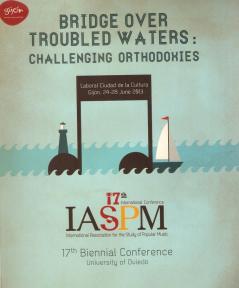IASPM- International 17th Biennial Conference. Bridge over troubled waters: challenging orthodoxies
Bridge Over Troubled Waters: Challenging Orthodoxies IASPM 17th Biennial Conference
24-28 June 2013 Universidad de Oviedo Place: Gijón, Spain
The popular music studies field in all its inter-disciplinarity has been characterised by encounter, dialogue and exchange, and also by tension. Our title 'Bridge Over Troubled Waters' takes the triple metaphor of bridge, inferring meetings and communication; trouble, indicating stresses and power struggles; and water, indicating flow and travel, as fertile themes for debate at the 17th Biennial IASPM Conference.
Confirmed Speakers:
Prof. Sara Cohen, University of Liverpool
Prof. Francisco Cruces Villalobos, Universidad Nacional de Educación a Distancia, UNED
Prof. Simon Frith, University of Edinburgh
Prof. Bruce Johnson, Macquarie University/University of Turku
Academic Commitee:
Celsa Alonso (Universidad de Oviedo)
Shelley Brunt (RMIT University)
Héctor Fouce (Universidad Complutense de Madrid/Universitat Oberta de Catalunya/IASPM Exec)
Laura Francisca Jordán González (Université Laval/IASPM Exec)
Claire Levy (Bulgarian Academy of Sciences)
Rubén López Cano (Escola Superior de Música de Catalunya)
Alejandro L. Madrid (University of Illinois at Chicago)
Ed Montano (RMIT University/IASPM Exec)
Carlo Nardi (University of Northampton/IASPM Exec)
Robert Strachan (University of Liverpool)
Martha Tupinambá de Ulhôa (UNIRIO/IASPM Exec, Chair)
Nabeel Zuberi (University of Auckland)
Local Arrangements Committee:
Eduardo Viñuela, Universidad de Oviedo, Chair
Conference tracks:
1. “Yesterdays” – Popular Music Until 1950* Convenor: Martha Ulhôa, Universidade Federal do Estado do Rio de Janeiro – UNIRIO.
Popular Music historical research is being amplified and made more feasible as online access both to old and new technologies increases. From 78 rpm recordings to early scores of 'entertainment' or 'light' music, as well as a myriad of nineteenth century newspapers and travellers' accounts, primary resources become increasingly available. Despite this, the research of past 'popular' music poses challenges both in practice and writing, as scholars deal with many layers of reception, whilst questioning and re-formulating well-established historical accounts of past musical practices. This stream seeks to ask, what are the methods used in the 21st century to approach popular music through the window of past archival evidence and 'older' technologies? We welcome papers from any theoretical perspective across the humanities and social sciences, and will group the papers by types of musical production or transmission (mechanical instruments, chapbooks, archival material, phonograms, recording companies, tape recording, film, musical theater, etc).
* The IASPM executive thanks Bruce Johnson for the idea for this stream. It is intended as a memorial tribute to Charles Hamm, IASPM’s first executive chair, and a champion for popular music history.
2. “Under the Bridge” – Popular Music at the Margins Convenor: Carlo Nardi, University of Northampton
The struggle of the newcomer to gain visibility, the aura of authenticity of the underdog, the seeming paradox of what Umberto Fiori called “unpopular popular music”, though in different ways and to different degrees, are all examples suggesting an ongoing tension between the “popular” and the music thus qualified. Just as new forms of popular culture developed in conjunction with industrialisation, migration and urbanisation, music has existed side by side with new related forms of exclusion. This stream invites papers that deal with the marginalisation and stigmatisation of musical forms, musicians and music studies, as well as with music and deviance, crime, violence, state policies and community-based programs.
3. “Rivers of Babylon” – Copyright, Technology, Creativity Convenor: Héctor Fouce, Universitad Complutense de Madrid/Universitat Oberta de Catalunya
The basic sources of musical creativity have traditionally been repetition and variation, with the reworking of sound materials shared by the community in the public space to create new forms. Arguably, many current practices fit this idea, but the growing pressure on intellectual property regulations creates quite a different framework. Digital technologies have enabled a multitude of phenomena based on cut and paste practices (remixing, sampling, mashups, etc.) that undoubtedly enrich our soundscape, but also challenge copyright orthodoxies, often consciously. In the global Babylon, musics circulate without a break, questioning the limits of authorship. Papers for this stream might deal with the following kind of questions: How are creative digital music production techniques being appropriated by users? What technological, legal and cultural issues are related to this music scenario? How is the industry reacting to copyright? With downloading and pirating, how are producers and musicians making money? How are policy makers and regulators responding to these structural and functional transformations? Where do those practices outside the conventional channels of distribution and consumption leave the gatekeepers of record companies and music critics?
4. “Build a Bridge” – Popular Music(s), Collectivities and Social Movements Convenor: Laura Jordan, Université Laval
This stream encourages papers on the various dimensions in which popular music helps build a sense of collectivity. Unbound by geographical borders, it may include virtual communities constructed and maintained on social networks such as Facebook, Twitter, and Youtube. Although citizenship/nation-based constructions and the practice of music in political movements are the most common associations, uses and meanings of popular music in collectivities might have different implications, for instance ethnic, age or gender related. Furthermore, conflicts around collective practices, such as censorship and identity struggles, usually embrace a musical dimension. Panels discussing a single topic from diverse disciplinary angles are particularly welcomed.
5. “Sail Away” - Place and Space - Sea, Travel, Cities
Convenor: Ed Montano, RMIT University
This stream invites papers that interrogate the local articulations, transnational flows and global manifestations of popular music. Papers that explore scenes and sounds from outside the Anglo-American axis are particularly welcome. What challenges and critiques can we make of the assumptions and perceptions around the links between music and place? Can we still speak in terms of cultural imperialism, globalization, scenes and subcultures? Is it true that the rise of social media and social networking, and the hyper-speed cultural collision facilitated by the web, have detached music from the tyranny of distance? How do geography and landscape continue to inspire and influence songwriters?

